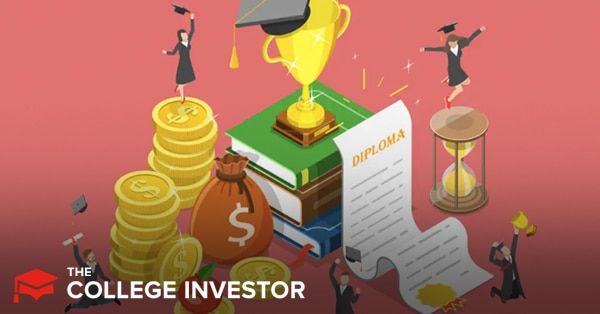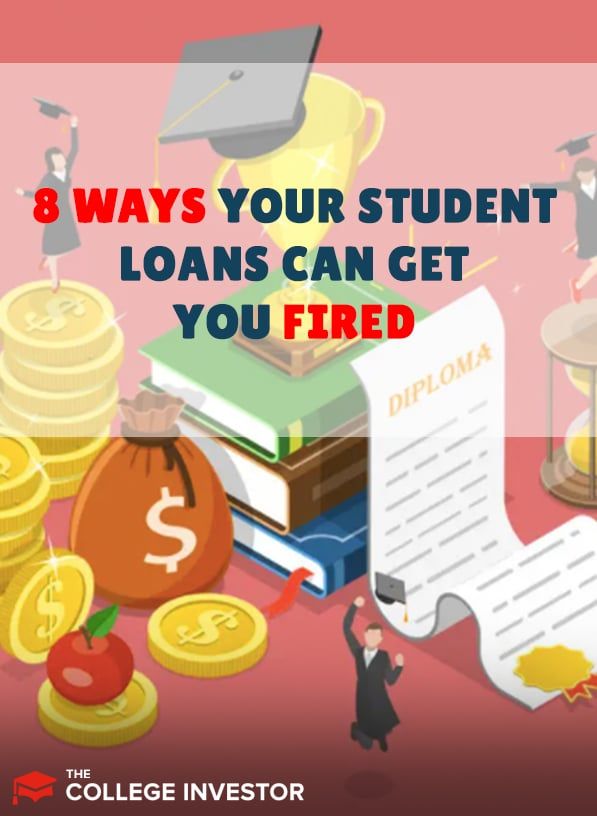
Did you know that your student loans could get you fired?
Imagine this: One day your boss pulls you into his office, sits you down, and says there is a problem. However, your work itself has been flawless. But he doesn't want to talk to you about work — he wants to talk to you about your credit report.
You see, when you were hired, you agreed to let your employer run your credit report (maybe unknowingly, simply signing a form in your hiring packet). And now, for whatever reason, your boss lets you know that HR has concerns about your debt. Suddenly, you go from star employee to looking for a job.
You already know that student loans suck. It's a fact of life. But did you know that your student loan debt can get you fired? It's happened, and here are eight reasons why, and what you can do to prevent it.
If you're not quite sure where to start or what to do, consider hiring a CFA to help you with your student loans. We recommend The Student Loan Planner to help you put together a solid financial plan for your student loan debt. Check out The Student Loan Planner here.
1. You're Distracted by Your Debt
This is a tough one because it's totally subjective. Your employer could have concerns that you're distracted and unproductive because of your student loan debt. Your employer could fear that your debt payments are not manageable, and that will put pressure on you while working.
If you're getting calls, emails, or even letters about your debt arriving at your workplace, this could put the nail in the coffin — beyond your student loans and credit score alone.
The bottom line is that you need to keep your student loan debt out of your workplace, or else you could be fired.
2. You're Viewed as Unreliable
The sad fact is, many people view large amounts of debt as a character flaw. Your boss may think, well, you can't handle your finances, so you probably can't handle a job. It doesn't matter that you took on this debt to go to school and better yourself.
Many employers check credit scores during the hiring process, and having a lot of debt (including student loan debt) could lead you to not getting the job.
But many companies have a lag time before this is discovered. For example, this woman was fired after six months of working because it took that long to discover her debt. Imagine working a new job for six months before getting fired for your student loan debt! That's awful.
3. Debt and Cash Handling Don't Mix
If you're in contact with cash or maybe the company's bank accounts, your employer might be concerned that shortage might occur and you might be the cause. Going back to #2 above, they might have concerns about your character, and think that you could use the company's money as an easy way out of your own student loan problems.
If you work in banking or financial services, it's very common practice for the institution to pull an employee's credit regularly — every six months or annually. If you flag as having a lot of student loan debt, or they have concerns about you making your minimum monthly payment, you will be flagged as high risk. And, in turn, you can be terminated for having that student loan debt.
4. You Must Maintain a Security Clearance
If you're going to have a job that requires a security clearance (and there were over one million public and private sector jobs that had a security clearance), you will be subject to a credit check. Having student loan debt shouldn't hurt you, but having any student loan debt in default could get you fired. The risk is that you could be vulnerable to being bribed by a foreign government in exchange for paying off your student loans.
Some contractors may even hire you, try to get you a clearance, and if you can't get cleared due to your loans, they fire you. If you're in the military, you may get demoted or reassigned.
But in most cases, they don't simply pull your clearance — they fire you too.
5. Your Employment Contract Says Your Must Maintain "Good" Credit
Many companies use employment contracts when hiring. Buried in the fine print on many of these contracts are phrases like, "The employee must maintain a good credit rating or higher . . . ." It's very vague, but it also gives employers reasonable cause to fire an employee if they have student loan debt.
It's important to note that simply having student loans isn't the issue — but having too much student loan debt can be. If your debt-to-income ratio is over 50%, your employer might be concerned, and depending on your contract, you could be terminated.
6. Workplace Rules Require You to Maintain "Good" Credit
If you work in a low-wage job, you may not have an employment contract — you will probably have some workplace rules or an employee handbook. This is equivalent to having an actual contract, and you are obliged to follow these rules, even if you didn't sign a specific contract stating you would — it's part of the terms of being employed.
In this case, if the workplace rules state that you must maintain good credit, you could also be terminated for having student loan debt and other credit problems.
Related: How To Get A Free Credit Report And Credit Score
7. You're Causing a Loss to Your Company
As crazy as it sounds, you can be fired for causing a loss to your company if you work in financial services. For example, if you work for a bank that issued your student loans, and you don't pay them back, you're causing your employer a loss — and you can be fired for it.
While not common, not paying your student loans back to your employer is the equivalent of stealing from them, and employers have fired employees for this very thing. And if getting fired wasn't bad enough, chances are that your employer will still come after you as a creditor.
8. You're Getting Your Wages Garnished
Finally, if you're getting your wages garnished due to your student loan debt, you can be fired as well. However, you can't be fired simply for having one wage garnishment — that's illegal. But if you have two or more garnishments, you can be fired.
So, if multiple student loan lenders are garnishing your wages, you could lose your job. Or, if you have one student loan lender, and another creditor garnishing your wages, you could also lose your job.
What the Law Says an Employer Can Do
On Requiring a Credit Check
Under the Fair Credit Reporting Act, an employer can require an employee to submit to a credit check. To conduct a credit check, the employer needs that employee's express written permission. However, most employers simply do this when hiring a new employee, and include an opt-out check box on the mass of employment forms they make you sign on your first day. However, it is perfectly legal to terminate an employee who does not submit to a credit check (in most places). It's similar to refusing to take a drug test.
You should know what's on this credit check. Track your credit for free at Credit Karma or pull your report annually at AnnualCreditReport.com.
On the Outcome of a Credit Check
This completely depends on your employment contract. If your employment contract states that your employment is contingent on maintaining good credit, your employer can fire you for your student loan debt.
However, if you don't have an employment contract (as in the case of many low-wage jobs), you need to see your employee handbook or workplace rules. Similar to an employment contract, if there are rules requiring you maintain good credit, you can be terminated.
Finally, if there are legitimately no rules in the workplace governing credit scores and credit reports, then the United States law applies. United States Code, Chapter 11 states that it is illegal for an employer to terminate an employee on solely the basis of bad credit or bankruptcy. This is the same code that governs bankruptcy law. But, it doesn't apply if an employment contract or workplace rule states otherwise — so, it still depends.
On Wage Garnishments
The Consumer Credit Protect Act states that an employer cannot terminate an employee due to one wage garnishment.
However, it is legal to terminate an employee due to more than one wage garnishment.
That means, if you have problems with student loan debt, and more than one creditor is coming after your wages, you could lose your job.
How to Know Where You Stand
The best defense against getting fired for having student loans is to know where you stand. This means checking your credit report regularly, and never missing a student loan payment. You should also check your credit before you start your job search.
If you want to check your credit report, there are a lot of free services like Credit Karma, that not only gives you your credit score, but also tells you what you need to do to improve. We love Credit Karma because it's free and they have a lot of great tools to help you improve your credit. They also have monitoring that can help you make sure that you maintain your credit score over time.
If you ever do get called into your employer's office to discuss your credit — don't accept getting fired. This isn't common, and in most cases your employer will work with you to help you improve your credit. Many larger corporations offer employee services that can help — like free financial planning. And even if you don't take advantage of it, simply telling your employer your plan to get out of debt, and offering to give them updates and check-ins, could help you save your job.
Have you ever been threatened with termination due to your student loan debt? Do you know anyone who has been fired because of their student loans?

Robert Farrington is America’s Millennial Money Expert® and America’s Student Loan Debt Expert™, and the founder of The College Investor, a personal finance site dedicated to helping millennials escape student loan debt to start investing and building wealth for the future. You can learn more about him on the About Page or on his personal site RobertFarrington.com.
He regularly writes about investing, student loan debt, and general personal finance topics geared toward anyone wanting to earn more, get out of debt, and start building wealth for the future.
He has been quoted in major publications, including the New York Times, Wall Street Journal, Washington Post, ABC, NBC, Today, and more. He is also a regular contributor to Forbes.
Editor: Clint Proctor Reviewed by: Chris Muller
